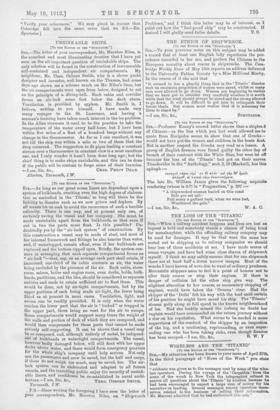[To THE EDITOR 07 THE "SPECTATOR. "] Sin,—As long as our
great ocean liners are dependent upon a system of bulkheads, reaching even the high degree of elabora- tion as embodied in the ` Titanic,' so long will there be the
liability to disaster such as we now grieve and deplore. By all means let us seek to avoid the recurrence of such a terrible calamity. There is one way, and at present only one, of certainly saving the vessel and her company. She must be made unsinkable apart from the bulkheads, so that oven if cut in two the parts must float. Is this possible P Un- doubtedly yes by the "air-lock system" of construction. By this construction a vessel may be made of steel, and most of her internal framework and fittings be also heavier than water, and, if waterlogged, remain afloat, even if .her bulkheads are ruptured and the bottom ripped open. Briefly, the system con- sists in arranging that each separate compartment forme an " air-look "—that, say, on an average each part shall retain, if immersed, one-third of its cubic contents as air, the water being excluded by the presence of the air. Each cabin, store- room, saloon, boiler and engine room, even decks, holds, bulk- heads, partitions, and the like, should be considered as separate entities and made to retain sufficient air to float them. This would be done, not by air-tight compartments, but by the upper portions of each being made air-tight, the lower being fitted as at present in most cases. Ventilation, light, and access can be readily provided. It is only when the water
• reaches the lower part that the air is " locked" or trapped in the upper part, there being no vent for the air to escape. Some compartments would support many times the weight of the walls and portion of deck of which they are composed, and would then compensate for those parts that cannot be made entirely self-supporting. It can be shown that a vessel may be so composed, and, although entirely of metal, be independ- ent of bulkheads or watertight compartments. The vessel, however badly damaged below, will still float with her upper decks above water, and these would form emergency quarters for the whole ship's company until help arrives. Not only can the passengers and crew be saved, but the hull and cargo, if these do not weigh too much, may be saved, too. The air- lock system can be elaborated and adapted to all future vessels, and the travelling public enjoy the security of unsink- able liners, and confidence be re-established in naval archi-
. P.S.—Since writing the foregoing I have seen the letter of your correspondent, Mr. Marston Niles, on " Shipwreck Problems," and I think this letter may be of interest, as I point out how the "fool-proof ship" may be constructed. If desired I will gladly-send fuller details. T. S.










































 Previous page
Previous page